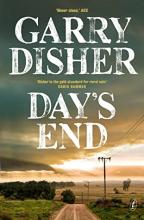Day's End, Garry Disher
The thing about a book by Garry Disher is that I know it's going to be good. But every single time I find myself marvelling at just how good.
Disher is a master at the art of the space - be it in the narrative, the place or the thing. He evokes a sense of place better than any other Australian crime author I can think of, and he does it without the need for massive amounts of description or detail. The characters in his books don't just inhabit their place, environment and job, they are them. It's seamless, and it's so clever it's worthy of all the accolades.
And yes, I'm a huge fan.
The "Hirsch" novels are set in the dusty dry environs of a small country town, on the edge of vast farming areas that might be sparsely populated but there's nothing limited or contained about these people. There's all sorts - farmers, townsfolk, teachers, students, dead-beats, druggies, ordinary every day country people, anti-vaxxers, and in Hirsch's words "covid-morons". For which comment he's been reported and yes, being dragged over the coals by the powers that be.
DAY'S END is echoed in the blurb here:
"Daybreak to day's end, dirt roads and dust. Every problem that besets small towns and isolated properties, from unlicensed driving to arson. In the time of the virus, Hirsch is seeing stresses heightened and social divisions cracking wide open."
It is an interesting, realistic and searing portrayal of the affects of COVID times on small-towns. Something less concentrated on during the endless reporting of the pandemic, but the impacts of lockdowns, vaccine mandates and COVID misinformation were just as real in isolated regions as they were in the more densely populated. And as I've always said, there's all sorts in a country town, just as there are in big cities, it's just that they stand out a bit more when the population is sparse. So here we've got anti-vaxxers and so called "sovereign citizens". We've got druggies and thieves, murder, bullying, kids forced to grow up before their time, busybodies and the purposely blind, racism, violence, deprivation, a backpacker who has simply vanished, and a light aircraft accident.
This time around it all makes for a very crowded plot, starting out with the vanished backpacker, quickly the focus moves to the bizarre discovery of a body in a burning suitcase, through to bullying, weird advertising of people's possessions for sale, godawful racist behaviour, a light aircraft that crashes over a disputed site, and the anti-vaxxer / covid is a hoax / sovereign citizen group who become very threatening.
Lot's happening needless to say and you do wonder sometimes if Hirsch wouldn't be forgiven for driving off into the dust and leaving the lot of them to sort it out for themselves - there's stoic and there's a glutton for punishment and Hirsch is teetering on a line there. That is part of the ongoing attraction of this series though. Hirsch is very real and flawed in his own way, and confronted by something appalling in this novel, hanging by a thread at points. Sure the plot is on the busy side, and there does seem to be a hell of a lot that goes wrong in a short space of time, in a remote location you'd be tempted to assume wouldn't have a lot on. But then I think of true stories like that of Larrimah in the NT and whatever went down in Kirkstall Victoria in July 2022 and think, well wherever there are people - there's weird stuff.
Disher seems to be able to mine the weird stuff well, never turning it back on the location and the people, never suggesting that rural Australia is wall to wall nutters, balancing always the fringe dwellers with the ordinary people, the place and the extremes with the kindness and the beauty that comes in different forms. The Hirsch series has developed into the perfect vehicle for that.
Hirsch’s rural beat is wide. Daybreak to day’s end, dirt roads and dust. Every problem that besets small towns and isolated properties, from unlicensed driving to arson. In the time of the virus, Hirsch is seeing stresses heightened and social divisions cracking wide open. His own tolerance under strain; people getting close to the edge.
Today he’s driving an international visitor around: Janne Van Sant, whose backpacker son went missing while the borders were closed. They’re checking out his last photo site, his last employer. A feeling that the stories don’t quite add up.
Then a call comes in: a roadside fire. Nothing much—a suitcase soaked in diesel and set alight. But two noteworthy facts emerge. Janne knows more than Hirsch about forensic evidence. And the body in the suitcase is not her son’s.
| Review | Day's End, Garry Disher | Karen Chisholm
|
Tuesday, November 1, 2022 |

